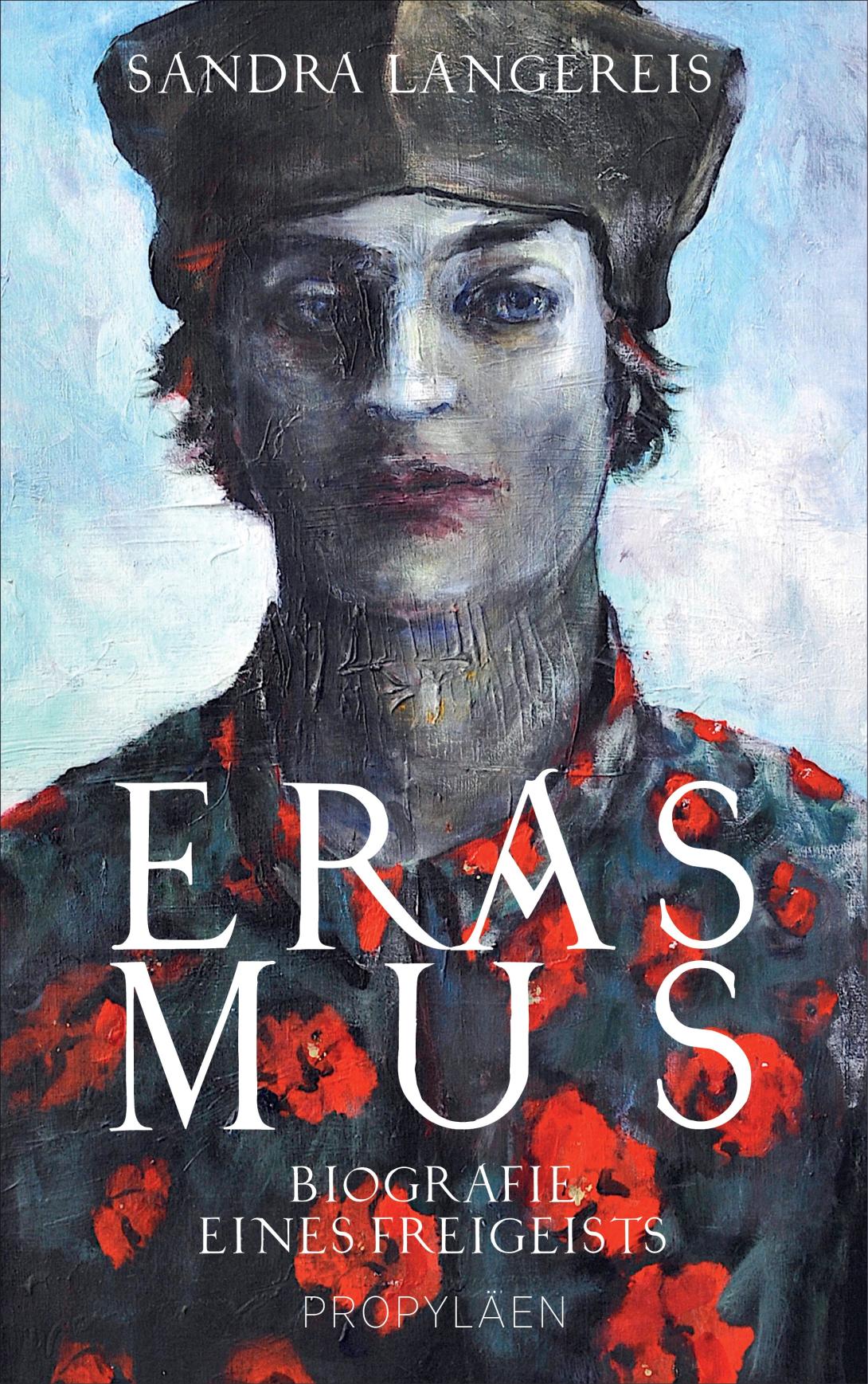The first intellectual of modern times

Sandra Langerei's biography of Erasmus - published in the Netherlands in 2022 under the title "Erasmus Dwarsdenker" (Erasmus the Lateral Thinker) - is not just a historical work; I don't think I'd be going too far in describing it also as a narrative work. In the Netherlands, Langereis was awarded the Libris Geschiedenis Prijs for this 700-page book (without notes). The historian embarks on a long journey - the clue is in the author's name (Langereis - "Long Journey") - taking the reader with her. She begins her book symbolically, with Erasmus, as the wooden figurehead of a ship, travelling the world, only to end up in a Japanese museum after several circuitous adventures. How better to sum up the worldwide significance of Erasmus of Rotterdam!
 Propyläen Verlag
Propyläen VerlagSandra Langereis | Erasmus - Biography of a Freethinker | Propyläen Verlag | 976 pages | 59 EUR
Erasmus was born in Rotterdam around 1468, the illegitimate son of a priest. Illegitimate because his father, denied the love of his life when his parents had him believe she had died, resolved to become a priest. Whether this is really true is not known; Erasmus was the only person to record it in writing, which by no means gives it veracity. What is true, however, is that his father was a priest and Erasmus was born out of wedlock. According to the Catholic doctrine, this meant that after his death he would be condemned to eternity in Hell.
His father, who had worked as a book copyist in Italy during his years of travel and had come to know and appreciate the emerging Renaissance there, ensured that Erasmus received a good education. However, he died too early to fully see it through. At that time, Latin schools were in the midst of upheaval as their teaching methods were changing. In the Middle Ages, it was usual to learn by rote, comprehension being not so important. Now, in the early Modern Age (so named at a much later date), there were teachers drawing their Latin knowledge from rediscovered ancient sources and who were keen to ensure that the pupils actually understood what they were learning. This new approach lodged itself in Erasmus and stayed with him for the rest of his life. He himself became one of the great Latin and Greek teachers of his time. He searched for ancient sources and pored over them, removing errors in translation from books that had been copied over and over again for a thousand years or more. He wrote a revised Latin version of the New Testament and thus laid the foundations for Martin Luther's German translation of the Bible, among other things.
Throughout his life, he spoke mainly Latin. As a theology student at the Sorbonne in Paris, he had hardly learnt any French and, during two long stays in England, no English. He learnt Greek in order to have a comprehensive understanding of the Latin sources (translated from Greek) for his editorial work, and also Hebrew for his Bible translations. This trilingualism remained his educational ideal throughout his life. His work explains the strong emphasis that 19th century Germans placed on the classical grammar school in higher education. The belief, which seems slightly naive today, that a better, fairer world could be created through education has its roots in Erasmus and his humanist contemporaries.
The invention of the printing press in 1440 created a readership far beyond the confines of the monasteries, which until then had been the place of books par excellence. Although still expensive, books made from paper were more affordable than the traditional parchment (very thin animal skin), and now that print runs were possible and books were no longer individual editions, they became available to a much wider circle. This was all the more true for those who could communicate in Latin. The fact that the educated spoke Latin made it possible for them to communicate with each other across all national and linguistic borders, just as the world does today with English. Over the course of his life, Erasmus succeeded in building up a network that spanned the whole of Europe. His texts were also read in all European countries. He was the most prolific and widely read author of his time. Writing, and getting his writing in print, was Erasmus of Rotterdam's life. Sandra Langereis gets to the heart of how this was achieved in an entertaining and fascinating way.
She does this by placing the events of Erasmus' life very precisely in his time. There are long passages in the 700 pages where the reader might wonder whether the author is more concerned with life in the decades before and after the year 1500 than with Erasmus himself. You learn about the daily routine of a monastery down to the smallest detail - as an adolescent, Erasmus was practically forced to join one by the executors of his father's estate; they intended to enjoy the inheritance for themselves, because as a monk, Erasmus could own nothing. This book explains how book printing developed and how and under what conditions the printers worked. Erasmus' life as a writer was strongly influenced by the fact that printers were extremely reluctant to pay royalties and therefore rarely did, and that authors' rights were completely unheard of. This is why Erasmus prefaced each of his books with a dedication to a high-ranking figure, often a king or an influential bishop, in the hope of receiving support from them in return. This "begging" afforded him enough to support himself until the fifth decade of his life, but it was only when, in his later years, he permanently joined forces with the Basel printer Froben that his financial situation improved significantly. Froben's printing company benefited in turn, as Erasmus' books were read throughout Europe. Sometimes the editions presented at trade fairs were sold out in just a few weeks.
Erasmus was born into a time of great change. The Middle Ages were over, and people were not turning away from God, but towards him in a completely new way. A more rational, more intellectual way. A way that put people at it's heart. Humanism was the magic word, and even contemporaries of Erasmus considered him to be their greatest humanist. Thinking for himself, not blindly believing dogma, using his own mind, wanting to understand the world without prejudice - these were the important principles that defined Erasmus' character. In his thinking, he was incorruptible and thus, of course, a danger to any kind of orthodoxy. In his restoration of traditional texts to their probable original form, Erasmus was treading on dangerous ground. He saw himself first and foremost as a philologist, but it could be a short step from this to being branded a heretic, and as such, you could quickly end up at the stake. It was mainly to avoid this fate that Erasmus withdrew to Basel from 1521 onwards.
Erasmus may have seen himself as a philologist, but his work could be attacked theologically, and indeed was. He discovered, for example, that the Holy Spirit was feminine in Hebrew, neuter in Greek and masculine in Latin. Such differences could easily lead to bitter theological disputes ending in bloodshed, as is still the case today in certain religions. He proved linguistically that original sin, so crucial in Christianity, was a later invention and was not previously mentioned in the original version of the Bible. He even cast doubt on Mary's virginity, today still an absurdity for deeply devout Catholics, believing as they do that Mary's virginity is based on reality, not an important attribute of the pre-Christian Great Mother Goddess (the Greek goddess Athena was also a virgin), who as Mary, Mother of God, was somehow able to survive difficult times of patriarchy.
Erasmus' view of religion also threatened the foundations of monarchy, as it implicitly called into question the divine right to rule, which was the basis of any claim to power. In his book In Praise of Folly, written in 1509, he criticised everything and everyone without mercy. It was a critique of the power relations and hypocritical ways of the church, nobility and the bourgeoisie. Erasmus was allowed to get away with this book, because it was not he, but foolishness, who had the floor in this book. And who, Erasmus argued, could take it seriously? We mustn't forget that in the early years, In Praise of Folly was read within a small, educated circle, so that those concerned could laugh at themselves without having to fear that criticism would spread too far. However, this changed during the course of Erasmus' life, partly because the book, written in Latin, was gradually translated into all the principal European languages. It is regarded as the only book by Erasmus still being republished and read today.
The printing press, the discovery of America, the incipient, unstoppable rise of Europe - all this happened during Erasmus' lifetime. This new epoch would last five centuries; the era known today as the Modern Age was its final phase. The rise of Europe was made possible by a new, broadly conceived rationalism and the resulting technical development. It was primarily in this respect that European cultures differed from other cultures of that time. In the first decades of his life, Erasmus was celebrated; it was only when Luther's radicalism challenged the foundations of the Catholic Church and the German princes could then secure political power, that the tide turned. Erasmus was not a revolutionary - rather, he saw himself as a reformer. If, before Luther's work, his supporters sometimes referred to him as the "God from Rotterdam", he was soon condemned by both Protestants and Catholics. After his death, many of his writings were banned by the Catholic Church or only recommended for reading and study in heavily censored form. This ban remained in place until 1966, at which point it was still not lifted, but only suspended.
Lateral thinkers, free thinkers - anyone who enjoys looking at and thinking about the world with an open mind will not only find Sandra Langereis' biography of Erasmus a wonderful read, but also a home, a refuge and a motivation to not let anyone or anything stop them from free thought. It is a balm needed as much, if not more so, in today's world as in the world of the 1500s.



